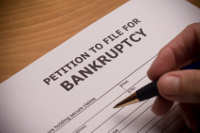Is your rewards card taking you on a trip to bankruptcy court?
By Maryalene LaPonsie

Alec Baldwin is so smooth, isn't he? With his charming smile, he makes you want to whip out your Capital One Venture rewards card and buy, buy, buy! But amusing commercials aside, I cringe a little at the thought of unsuspecting folks racking up thousands in debt for a plane ticket worth $500.
Rewards credit cards can be great if you know how to use them, so let's make sure you are using them right by going over the pros and cons of what's in your wallet.
The pitfalls of rewards credit cards
Let's start with the bad news: That rewards card in your pocket may be paying you some cash, but it's also likely leading you into debt.
At the end of 2010, the Federal Reserve Bank of Chicago completed a study on consumer habits and rewards cards. They found that, when offered a one percent cash back reward, consumers increased their credit card spending by $68 each month. Meanwhile, their payments decreased, which meant their total quarterly credit card debt increased by $115. The pay-off for the extra $115 in debt? A $25 reward.
Now, I know you may be thinking that having an extra $115 in debt is nothing. You could pay that off by skipping Chinese take-out next month, right? True, you could. But will you? I mean, if you were going to pay it off, wouldn't you have done it before it tacked an extra $115 on to your balance? Rack up extra debt on a regular basis, add some double digit compound interest, and you may be in for nearly $500 before the year is out.
And that is the underlying problem with rewards credit cards.
3 tips for using your card the right way
Despite their pitfalls, rewards credit cards can be a useful tool. But like zero balance transfer fee cards, you have to know how to use them right. Try these tips to beat the credit card companies at their own game:
- Only buy what you need: If you have to go back-to-school shopping for your kids anyway and can earn points by putting the purchase on your credit card, go ahead and do it. However, don't inflate your 'needs' just because you're using plastic to pay. It may be tempting to throw a few extra items in the basket and convince yourself it's okay because they will contribute to your vacation fund, but that thinking can get you in trouble. Instead, make a budget based upon what you could afford if you were paying cash and stick to it.
- Pay off your balance every month: Isn't it so sweet of your credit card company to let you pay only $35 a month on your thousand dollar debt? The credit card companies would be thrilled to have you pay off your debt as slowly as possible. Letting interest accrue is a sure way to wipe out any benefit that comes from your rewards card. If you can't pay your card off each month, then you are charging too much.
- Know thyself: This is perhaps the most difficult step to becoming financially savvy because it involves admitting you are not perfect. If you know you lack the self-discipline to buy only what you need and pay off your balance each month, then maybe rewards credit cards aren't for you. It's better to be realistic and miss out on a free plane ticket than to end up with enough credit card debt for a one-way trip to bankruptcy court.
When choosing when to use your rewards card, or whether to open one at all, remember that your friends at Visa, MasterCard and Discover aren't being generous out of the goodness of their hearts--they are counting on you to spend a lot in order to save little.
Maryalene LaPonsie has been writing professionally for more than a decade on a variety of subjects including life insurance and personal finance. She helps consumers navigate topics such as creating budgets, using credit wisely and protecting income and assets by making smart insurance choices. Maryalene holds a Bachelor's Degree in Political Science from Western Michigan University.